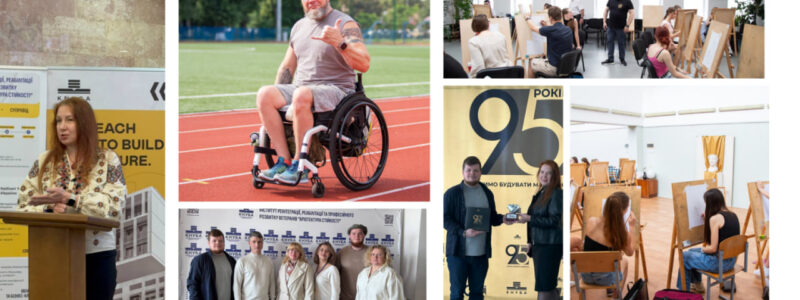
The admission campaign is in full swing at the Kyiv National University of Construction and Architecture (KNUBA) – creative competitions for applicants began in early July. Among those taking exams this summer are Ukrainian defenders. In particular, veteran Vadym Honcharenko and several of his comrades have decided to enroll at KNUBA. They have chosen modern and sought-after specialties, such as architecture, industrial and civil engineering (ICE), physical education and sports (coaching), cybersecurity, as well as a field to which the university pays special attention – ecology and environmental protection technologies (EPT). According to the veterans, they understand the importance of higher education and retraining: new knowledge will help them join the great reconstruction of the country and find themselves in a peaceful life. Vadym Honcharenko, who uses a wheelchair, notes that continuing his education is both a challenge and an opportunity for him. For the university and the Ukrainian Veterans Cluster, this case highlights the relevance of accessibility issues: they are now jointly seeking funding to adapt the educational space to the needs of students with disabilities.
“The war will end sooner or later, but education and reconstruction will definitely continue. We need to prepare for this now,” said Natalia Goncharenko, head of the Ukrainian Veterans Cluster, quoting a well-known opinion about the inevitability of peace and development. As the leader of a veterans’ organization, she emphasizes the need to invest in veterans’ knowledge today. Natalia added that the admission campaign is ongoing, and those who wish to obtain a master’s degree on a budgetary basis still have a chance to submit their documents—the state and partners provide separate funding opportunities for veterans. Thanks to the efforts of the Veterans Cluster and KNUBA, with the support of business partners, a program of special scholarships for veterans and their families has already been launched. The first benefactor of this initiative was Axor Industry. At a recent event dedicated to the launch of the Re:Veterans Platform reintegration program, Axor’s Deputy Marketing Director Olena Krekina presented a program of cooperation between employers on internships and employment for veterans. As a stakeholder representative, Olena is preparing to teach at the university starting next academic year in order to directly share her experience with veteran students.
These innovations are being implemented in line with the state policy of supporting defenders. On July 11, KNUBA and the Ministry of Veterans Affairs signed a memorandum of cooperation that expands opportunities for training and professional adaptation for veterans in Ukraine. “For the university, the veteran program is a response to one of the main challenges facing the country. We help veterans gain a new profession and return to civilian life with relevant knowledge and skills,” said KNUBA Rector Oleksii Dniprov. According to Deputy Minister for Veterans Affairs Yulia Kirillova, combatants and their families can now obtain a master’s degree at KNUBA free of charge, as well as obtain another specialty based on a previously obtained diploma. In addition, veterans and their children can study at colleges affiliated with the university under a state program (CMU Resolution No. 432). For its part, the university provides the Ministry with expert support in creating a modern infrastructure for veterans. In particular, specialists from KNUBA and the Institute for the Reintegration of Veterans “Architecture of Resilience” are involved in developing the concept of “veteran spaces” — a network of multifunctional support centers for veterans and their families. It should be noted that KNUBA students who are children of veterans are already eligible for compensation for one year of study. All these steps are designed to ensure a smooth transition from military service to a successful civilian career for our defenders.
Veteran reintegration: employment and entrepreneurship after the war
The Ukrainian Veterans Cluster emphasizes that the most important result of all educational initiatives is a veteran (and their family) who is employed or a veteran entrepreneur who has started their own business. The goal is not only to obtain a diploma, but also to enable defenders to become economically independent and successful in peaceful life. Global experience confirms that the integration of veterans into the economy through education, work, or entrepreneurship gives a powerful impetus to the development of a country.
“Veterans are not only a force that protects, but also a force that builds,” emphasizes Axor, a company that supports veteran initiatives. The main task is to help defenders realize their potential in peaceful life. In Ukraine, this philosophy is already being implemented through retraining programs, partnerships with businesses, and support for entrepreneurship among former military personnel. After all, every veteran who finds employment or starts a successful business is not only a personal victory for the soldier, but also a contribution to the sustainable development and recovery of the country.